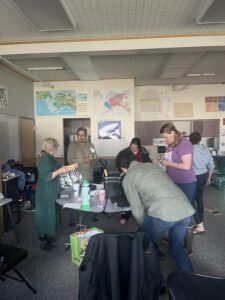Progress report for WPDP24-023
Project Information
Rural Alaska Community Action Program’s Growing Rural Opportunities for Wellness (GROW) proposes the Bering Strait Ag Leader’s Summit project. This project will host 12-15 ag professional leaders from different communities in the Bering Strait region of Alaska. The participants will convene annually to learn about sustainable agriculture practices. Topics will include building healthy soil, season extension, instruction on hosting seed starting workshops in rural communities, and local plant knowledge about regional gardening practices. The project will use culturally and bio-regionally relevant resources to disseminate information on sustainable agriculture practices. The program will collect feedback from participants after workshops to refine and develop subsequent meetings. Ag professionals from all corners of the Bering Strait region will meet, connect, and become long-term resources for one another to share information on agricultural practices. Participants will be empowered with the skills, knowledge and support to pass along knowledge of sustainable agriculture to other community members. This project will effectively create a network of ag leaders, spread sustainable agriculture practices, and stimulate food security and employment in the region.
The Bering Strait Ag Leaders’ Summit will promote sustainable, long-term local agricultural education in the Bering Strait region. Through the workshops, Bering Strait community ag leaders will learn and implement principles and practices of sustainable agriculture, including the use of local resources for soil creation, harnessing the waste stream for soil amendments, and simple technologies for warming soil and extending the growing season. Participating ag professionals will be empowered with the skills, knowledge and support to pass along knowledge of sustainable agriculture practices to other community members. In-person meetings will create a space for the exchange of innovation and ideas and build a community of ag professionals. Knowledge will be passed on by community events, social connection, and supplemental educational materials produced by this project. Bering Strait ag leaders will be supported in securing funding for their community gardens. Ideally, multiple new part-time gardening jobs will be created in the Bering Strait region, boosting employment in those areas. Participants will meet in person, exchange ideas and information, and maintain connections, effectively building a regional network of ag professionals.
The project aims to train around 12-15 agricultural leaders in soil creation, composting, and basic season extension each year. Participants will return to their communities and host events on sustainable gardening topics including planting, soil development and care. Currently, the 15 villages in the Bering Strait region have no dedicated Cooperative Extension Agent. This project will begin to fill that gap in technical service by training a network of agricultural professionals.
The project leaders and cooperators will begin to develop the workshops in early 2024. The first workshop will be held in the summer of 2024. 12-15 project participants (2-3 from each community) will attend and participate in hands-on discussions and lessons. Participants will leave with historical and regionally relevant information about sustainable gardening techniques, as well as new connections with other producers in the Bering Strait region. Project participants will hold two community events in 2024. These will be local events community members attend and knowledge from the workshop can be passed on through social connection. The community events are expected to connect with about 25-50 residents. In the fall of 2024, the program will facilitate a garden reflection, where each participant prepares a success or learning experience from the growing season to share with the cohort. This schedule will be repeated in 2025 and 2026, with continual workshop development, communication between cooperators, and community participation.
Cooperators
- (Educator)
Education
This project uses a hands-on, community-based workshop style of education. Traditional models of agricultural education may not be successful with historically marginalized communities - language, technology, and internet access are barriers to accessing existing educational materials. Participatory classes, where peers can learn from each other and develop skills specific to their region and cultures, are most effective. Therefore, the focus of the project is the Bering Strait Ag Leaders' Summit (BSALS), an annual in-person workshop held in a community in the Bering Strait region. In July 2024, the workshop was held in Unalakleet, and experiential learning took place at the Unalakleet Community Garden and around the community. During the workshop, lectures, demonstrations and group discussions set the theoretical foundation for experiential learning activities where participants were able to immediately apply newly acquired knowledge.
Beyond the annual in-person workshop, RurAL CAP GROW staff provide ongoing technical assistance to support funding and education for community ag leaders. A WhatsApp group chat established at the in-person workshop provides a forum for ag leaders to continue informally sharing and learning from each other. One group meeting was held virtually over Zoom in September 2024, as a space for ag leaders to discuss their work and plans for community education events. Depending on interest, additional virtual group meetings will be organized quarterly. BSALS attendees will host at least one community educational event in their home communities to pass along the knowledge they gained at the workshop. These community events are expected to take place in spring or summer 2025. Originally, this project proposed for trainees to host two events, but it has become clear that this is excessively burdensome. In subsequent annual in-person workshops, project organizers intend for returning participants to take on a larger role in sharing their knowledge and experiences.
Even in the classroom, workshop teachers incorporated hands-on activities. Pictured above, Cheryl Thompson teaches seed starting and discusses strategies for hosting community seed starting workshops.
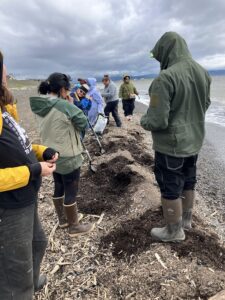
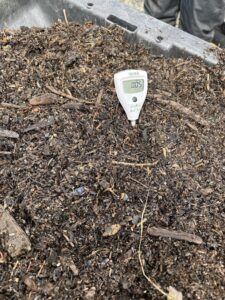
Education & Outreach Initiatives
Increase knowledge of building soil from local resources, composting and growing vegetables amongst 12-15 ag leaders in the Bering Strait region.
The first annual Bering Strait Ag Leaders' Summit, held in July 2024, was an in-person workshop to promote sustainable, long-term local agricultural education in the Bering Strait region. Through the workshop, Bering Strait community ag leaders learned and implemented principles and practices of sustainable agriculture, including the use of local resources for soil creation, harnessing the waste stream and local resources for soil amendments, and simple technologies for warming soil and extending the growing season.
This workshop was hosted by Cassandra Johnson and the Unalakleet Community Garden in collaboration with RurAL CAP. Instructors included UAF soil scientist Dr. Caley Gasch, Nome's Cheryl Thompson (Master Gardener and gardening teacher), and RurAL CAP's Emily Becker (Master Gardener, Permaculture Designer). Although the workshop did include some lectures and indoor activities led by instructors, the agenda emphasized experiential and peer-to-peer learning. Participants included fifteen gardeners representing seven communities from the Bering Strait and neighboring regions, including Unalakleet, Golovin, Stebbins, Kwethluk, Kiana, Nome and Elim. Trainees ranged in age from seventeen to mid-sixties, and most were women. The group also included a baby and child who attended along with their moms. All but two participants, a mother and son who had recently moved to rural Alaska from the Philippines, were longtime residents of the region, and most were Alaska Native. Participants had a range of agricultural experience levels, and all had interest and intent or were currently growing food for their communities.
Participants arrived on Friday evening, most on a chartered flight that made several stops at different villages on the way from Nome to Unalakleet. The first evening was spent sharing dinner and settling into the modest accommodations provided by the school. Due to the remote location of the training, all meals were prepared by program staff and instructors, with assistance from participants.
The first day of the training started off with communal breakfast and group agreements. The primary goals of the workshop were established: to foster networking among regional growers, enhance their skills, and promote community involvement in sustainable agriculture. Participants introduced themselves, sharing their gardening experiences and expectations for the workshop. This informal setting helped to build rapport among attendees. From 10 AM to 12 PM, participants engaged in hands-on activities related to community garden projects, fostering collaboration and practical learning. The work in the garden, completed over the two days of the training, included cleaning and organizing supplies, repairing a ripped and broken high tunnel, planting three crab apple trees, building eight soil sifters, planting strawberries, amending all soil in the garden with local soil resources and fish bone meal, and constructing and filling two raised garden beds with local soil resources and fish bone meal. Following lunch, Dr. Caley Gasch led an engaging session on "Intro to Soil Science," using demonstration and lecture to highlight the importance of soil health for successful agriculture. In the afternoon, attendees participated in a field trip focused on soil resource collection, providing practical insight into local soil types and their management. After a shared dinner, most participants joined together for an evening walk on the tundra. Participants informally shared knowledge of native plants and picked some berries.
The second day began with breakfast at 8:30 AM, followed by a session led by Cheryl Thompson from Nome. From mid-morning to noon, participants explored "Growing Vegetables, Seed Starting, Catalogs, and Worms," diving into various strategies for enhancing vegetable production. After lunch, attendees finished up hands-on work in the community garden. The training concluded with an indoor session led by Emily Becker, which covered composting options, creating a garden calendar to help plan their gardening activities throughout the season, and planning for community education activities.
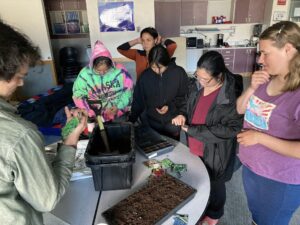
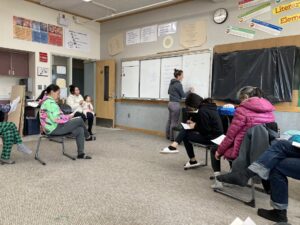
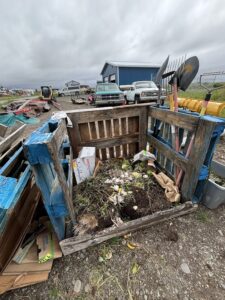
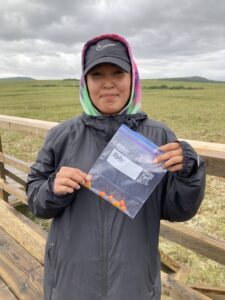
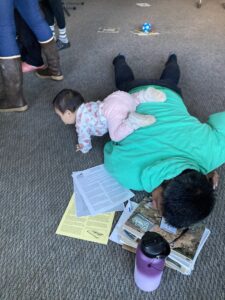
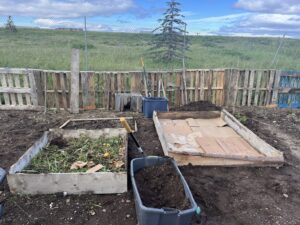
Learning outcomes were measured by self-reporting on anonymous surveys collected at the end of the workshop. Of the fifteen participants, thirteen responded to the two anonymous surveys - the 2024 Western Region Sustainable Agriculture Research & Education Program Outreach Survey and an additional survey created by RurAL CAP project staff. Notably, ten participants rated the workshop as excellent and three rated it as good. 100% of those surveyed reported that the workshop provided new knowledge and that they gained skills for building soil using local resources. One participant wrote, “Excellent hosts and teachers. The handouts are super helpful: I understand composters more now and feel very comfortable about making our own soil!” Please see below for the complete survey results.
Action outcomes include the work that was completed at the Unalakleet Community Garden by participants during the experiential learning portions of the workshop. This included cleaning and organizing supplies at the garden, repairing the high tunnel, planting three crab apple trees, building eight soil sifters, planting strawberries, amending all soil in the garden with local soil resources and fish bone meal, and constructing and filling two raised garden beds with local soil resources and fish bone meal. As well as this completed work (pictured below), action outcomes will also include community education events hosted by workshop participants, wherein participants will share the knowledge they gained at the workshop. These events are expected to take place during spring/summer 2025. With funding from a different grant, RurAL CAP commissioned the construction and shipment of twelve accessible table garden beds (pictured below) that will be filled with local soil resources by workshop attendees and other community members. Other plans for community education events include seed starting and composting.
The Unalakleet Workshop successfully fostered community engagement and skill development among gardeners in the Bering Strait Region. The collaborative atmosphere allowed participants to network, share experiences, and learn from experts in the field. With funding provided by the Western SARE Professional Development Program, this workshop marked a significant step toward enhancing local food production and sustainability practices. The participants left not only with new skills and knowledge but also with a strengthened sense of community and support for their agricultural endeavors.
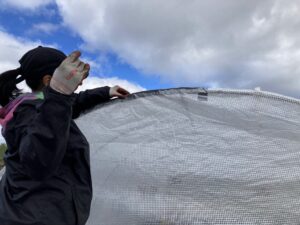
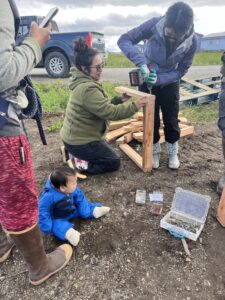
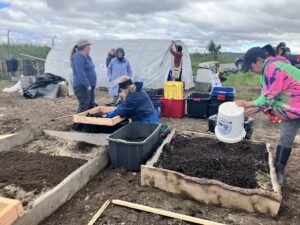
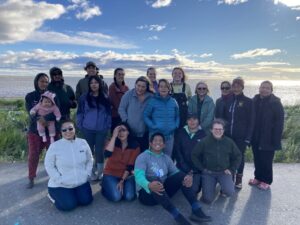
Educational & Outreach Activities
Participation Summary:
Learning Outcomes
Project Outcomes
Less than a year into the project, the outcomes of this project’s activities include increased knowledge and skills and connectedness between agricultural leaders in the Bering Strait region. Learning outcomes are summarized based on the results of the anonymous surveys collected at the end of the workshop:
Bering Strait Ag Leaders’ Summit Evaluation: Unalakleet 2024
13 surveys completed
Content
I gained skills for building soil using local resources
|
Yes |
No |
N/A |
|
13 |
0 |
0 |
I gained knowledge in how to compost in rural Alaska
|
Yes |
No |
N/A |
|
12 |
0 |
1 |
I learned tips and strategies for extending the season
|
Yes |
No |
N/A |
|
11 |
0 |
2 |
Visual aids and handouts were useful
|
Yes |
No |
N/A |
|
13 |
0 |
0 |
Hands-on experience were useful
|
Yes |
No |
N/A |
|
13 |
0 |
0 |
Comments:
- Excellent hosts and teachers. The handouts are super helpful: I understand composters more now and feel very comfortable about making our own soil!
- Amazing Speakers
- Hands on training I love doing 😊 Learned a lot!
Logistics
Communication Prior to Workshop
|
Excellent |
Good |
Need to Improve |
N/A |
|
8 |
2 |
2 |
1 |
Organization in UNK
|
Excellent |
Good |
Need to Improve |
N/A |
|
9 |
4 |
0 |
0 |
Meals
|
Excellent |
Good |
Need to Improve |
N/A |
|
13 |
0 |
0 |
0 |
Lodging
|
Excellent |
Good |
Need to Improve |
N/A |
|
9 |
3 |
1 |
0 |
Comments:
- Seamless and easy, tons of planning went smoothly
- Awesome!
What was your favorite and why?
- The food, sleep time
- The soil presentation was great, love learning about soil. My other favorite part was hearing the questions from everyone because I learn from their questions as well.
- Soil preparing, green house repairing, Sheryl’s Discussion.
- The diversity of our group. How well we all worked to accomplish a goal.
- Working in the garden & seeing it come together. Learning about the river mulch & checking on salinity levels.
- All the labor stuff.
- Practically everything w/ hands on work.
- The hands-on training at garden
- Learning more about gardening & meeting people was fun!
- All
- Working together with many ideas
- Everything with other people helping.
- Hands on work in the garden.
What suggestions do you have for improvement? (Workshop will occur again in 2025 and 2026!)
- Nothing. Great!
- Starlink system for Wifi. Inviting more people! The more the Merrier! Understand funds bay be limited or already allocated.
- Plant ahead. Prepare timeline to follow.
- Schedule cook/clean up for all participants.
- Starter packages of worms for about 5 door prizes.
- Add more labor stuff.
- Did well.
- n/a
- I don’t think so, workshop was great! 😊
- n/a
- Nothing. It was excellent
- More on the soil and how the soil works.
- Keep in touch so we can swap ideas.
Overall, how would you rate this workshop?
|
Excellent |
Good |
Fair |
Poor |
|
10 |
3 |
0 |
0 |
Western Region Sustainable Agriculture Research & Education Program Outreach Survey 2024
13 surveys completed
Everyone:
Improved my Awareness of the topics covered
|
Yes |
No |
NA |
|
12 |
0 |
1 |
Provided new knowledge
|
Yes |
No |
NA |
|
13 |
0 |
0 |
Provided new skills
|
Yes |
No |
NA |
|
11 |
0 |
2 |
Modified my opinions and/or attitudes
|
Yes |
No |
NA |
|
13 |
0 |
0 |
How many people do you estimate you will share some aspect of this project within the next 12 months?
- 1,000.
- 50+.
- 30-40.
- 10. 12.
- Unsure.
- 5.
- Like 20.
- 9.
- 20.
Producers – In the next year I am likely to use some aspect of this project to:
Adopt one or more of the practices shown
|
Yes |
No |
NA |
|
11 |
0 |
2 |
Increase the operation’s diversifications
|
Yes |
No |
NA |
|
8 |
0 |
5 |
Reduce my use of purchased off-farm inputs
|
Yes |
No |
NA |
|
7 |
1 |
5 |
Increase my networking with other producers
|
Yes |
No |
NA |
|
9 |
0 |
4 |
Incorporate value-added into some aspect of my operation
|
Yes |
No |
NA |
|
8 |
1 |
4 |
Professionals – In the next year I am likely to use some aspect of this project
In an education program that I plan or participate in
|
Yes |
No |
NA |
|
9 |
0 |
4 |
As a resource I will make available to producers
|
Yes |
No |
NA |
|
7 |
0 |
6 |
As a professional development tool for my peers
|
Yes |
No |
NA |
|
7 |
1 |
5 |
To improve advice/counsel I give to my producers
|
Yes |
No |
NA |
|
8 |
0 |
5 |
Professionals- Please describe how you are likely to use some aspect of this project for an educational purpose?
- I plan to host a community engagement workshop that will unite locals to learn how to collect/build sav, build raised beds, sift soil
- Tell my coworkers how to grow stuff
- To show the girls back at home 😊 and whoever would like to learn
- Work on a community compost project
"Last summer I had the honor of working with the of Rural Alaska Community Action Program, Inc. (RurAL CAP) staff at a gathering they hosted in my home community of Unalakleet. It was so engaging and effective that within a week of the training ending I had planted up a garden bed of strawberries with my 4 young nieces, started sprouting foodplant starts in my home, found and relocated rhubarb starts from my driveway into a newly prep-ed garden bed, and made plans for how to better over-winter my gardens and have more effective potato harvest. It was perhaps the largest flurry of immediate action I've ever seen in myself post training in any capacity." - Unalakleet community gardener
